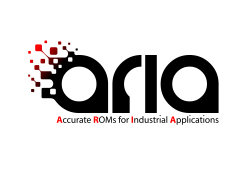The overarching objective of ARIA (Accurate Roms for Industrial Applications) project is to form an international and intersectoral network of organizations working on a joint research program in numerical modelling, specifically in the fields of model reduction and convergence between data and models.
 |
Reduced-order models (ROMs) are simplified mathematical models derived from the full set of partial differential equations governing the physics of the phenomenon of interest. We focus on ROMs that are data-driven as they are based on relevant solution data previously obtained. With ROMs one trades accuracy for speed and scalability, and counteracts the curse of dimension by significantly reducing the computational complexity. ROMs represent an ideal building block of systems with real-time requirements, like interactive decision support systems that offer the possibility to rapidly explore various alternatives. For that reason, ROMs are receiving high attention by industrial end-users, e.g., for applications like interactive aerodynamic vehicle design, real-time operational optimization of wind farms, and the optimization of medical devices for patient-specific therapies, as also shown by the large spectrum of industrial participation to this RISE action. |
New approaches to this challenge are proposed here with a focus on the Navier–Stokes equations of fluid flows, one of the most challenging continuum models. Accordingly, we have organized our research activities around the following key objectives:
- Advance the state-of-the-art in projection-based ROMs by leveraging ideas from large eddy simulation (LES).
- Enhance data-driven modeling via data-geometry inference tools such as manifold learning, solution classification and clustering, adaptive sampling. Integrate ROMs into a multi-fidelity model chain using rigorous error indicators and assess performance in cases of industrial and applicative interest.
ARIA project will lead to major advances in our capability and understanding of the nonlinear dynamics of unsteady multi-scale flows and related phenomena. The proposed research has the potential to impact our ability to model the nonlinear dynamics of a much wider range of complex phenomena, including, for instance, the dynamics of biological systems and the financial systems.
Participants to ARIA project will exchange skills and knowledge through secondments and thematic workshops, which will allow them to progress towards key advances in modeling multi-scale nonlinear physical phenomena. This project will strengthen collaborative research between different countries (France, Germany, Italy, Spain) and sectors fostering applications in industrial flow control and optimization, and computer assisted surgery. Advances in flow control and optimization will have potential market opportunities for non-academic participants in the project towards greener terrestrial vehicles, more efficient wind farms, revolutionary cost-efficient prediction software’s, and decision-making support tools for diagnostic and prognostic of vascular diseases, with a significant benefit for European society.
The staff members who participate in the project will develop new skills in data-driven physical modeling, be exposed to new research environments and have their career perspectives widened thanks to a cutting-edge expertise. Even with rapid advances in software information technology and hardware computer technology, certain biological and physical systems remain beyond our ability to mathematically model and compute. Junior staff of this project will be formed to an array of mathematical methods for constructing predictive ROMs with guaranteed robustness, reliability and efficiency for applications involving these extremely complex physical phenomena.



